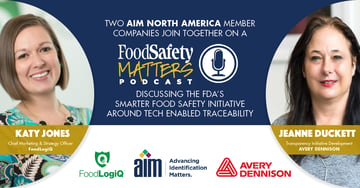Food safety is one of the top concerns facing the food industry. Everyone in the industry has a responsibility, individually and holistically, to maintain public health. After all, their efforts are closely monitored by the FDA, USDA, CDC, Department of Homeland Security, EPA, and state and local regulators to make sure you comply with food safety and don’t compromise public health for their own gains.
3 Important Food Safety Stats
The above parameters and tools keep the public healthy and safe from food contaminations, and food traceability plays a huge role in that. The ability to track food from the farm to the table allows all industry entities to closely monitor movement of product. If food is exposed to contaminants at any point, it’s easier for organizations to mitigate the risks and keep food out the hands of the public.
Organizations best understand the importance of traceability when they analyze some of the facts surrounding food safety. These statistics are meant to open the eyes of those in the food industry and encourage traceability and transparency across the board.
#1: Each year 48 million people get sick from foodborne illnesses, 128,000 are hospitalized, and 3,000 die
Many people are under the assumption that foodborne illness is more of a problem in developing countries where regulations aren’t as strict, but it hits closer to home more often than we think. Thanks to traceability, the CDC can closely monitor all cases of foodborne illness that come through the United States, and the stats aren’t pretty.
It’s nearly impossible to eradicate foodborne illnesses. There are too many factors that go into it, some out of our control, but more can be done for prevention. When organizations employ enhanced traceability programs, combined with effective safety plans, auditing and corrective actions, the risks of contamination are much lower. Companies can monitor exactly where their food was, is, and will be, maintaining total visibility across the supply chain - and react quickly when a food safety issue hits.
Additionally, when foodborne illnesses crop up, as they’re bound to do, traceability can reduce exposure. As soon as the adulterated food is identified, it can be recalled to prevent further illness and used to analyze the medical action needed to rectify the situation.
#2: About 23 percent of food recalls cost the food industry $30 million and 52 percent cost organizations $10 million
These stats are staggering. Executing a recall on food products can be a manufacturer’s worst nightmare simply because of the time and money lost. Recalling products is an essential part of maintaining public health, but it can be stressful.
Consider one E. coli outbreak in Germany. It’s difficult to contain, and in this instance, there wasn’t strong traceability throughout the supply chain. 3,800 people were affected worldwide, 47 died, and European Union farmers lost $611,000,000 per week. The holistic cost of this incident shows that traceability is essential to healthy food industries.
As a part of the traceability system, the Food Safety Modernization Act (FSMA), which was passed in 2011, cultivates certain standards throughout the supply chain meant to mitigate risk when a recall is required. However, as mentioned previously, illnesses can’t be prevented completely, and there must be a proper way to reduce the number of illnesses spread globally.
When organizations employ traceability software, recalls are much easier to handle. FSMA requires documentation and a corrective action plan – and software like FoodLogiQ Connect can help you document accurately. And with easy exporting of your documentation, you can respond to an FDA documentation request with precision, accuracy and speed.
The expense of a recall is significantly lower with traceability software because it allows an organization to catch the problem quickly and take steps to reduce wasted product, lost money, and illness. The wasted product and employee compensation numbers are much smaller when you’re able to nip the problem in the bud.
#3: Reducing foodborne illnesses by just 1 percent would prevent half a million Americans from getting sick each year.
If we used traceability to reduce foodborne illness by 10 percent, 5 million Americans could avoid sickness. This will require a more strategic approach from individuals and food organizations alike.
Reducing foodborne illnesses so drastically will require a new perspective on how we view foodborne illnesses and mitigate risks. In 2013, the United States spent about $40 million on treating the problem but not preventing it. Through the adoption of traceability software, organizations can shift the focus towards prevention, saving money and lives.
Reducing foodborne illnesses won’t be an easy task, and it relies on individual organizations making decisions that impact society as a whole. As they employ traceability software, they’ll start to make an impact and take us closer to reducing these issues.
Use FoodLogiQ Connect for Better Supply Chain Data
FoodLogiQ is an industry leader in food tracking systems that major food organizations like Whole Foods Market and Subway/IPC trust. With our software, organizations can keep a closer eye on where their food moves in the supply chain system, from the farm all the way to the table. With this comes reduced foodborne illnesses and decreased recalls for your food supply chain.
We offer visibility for your supplier network by helping you build a FSMA-compliant network and improve your entire food supply chain. Managing all your suppliers in one place will save you considerable time and improve efficiency in your network.
We offer both speed and accuracy in identifying harmful contaminants in your food and making sure it’s taken off the market as quickly as possible. By implementing FoodLogiQ Connect before a recall occurs, you can be prepared for the worst possibility and save considerable time and money in the process.
Schedule My Free Demo
Other posts you might be interested in
View All Posts
Traceability
3 min read
| January 16, 2020
Food Safety Matters: Partnering on Food Traceability and Transparency
Read More
Food Industry
6 min read
| June 14, 2018
The Cost is High When it Comes to Foodborne Illness
Read More
Food Industry
11 min read
| December 9, 2022

